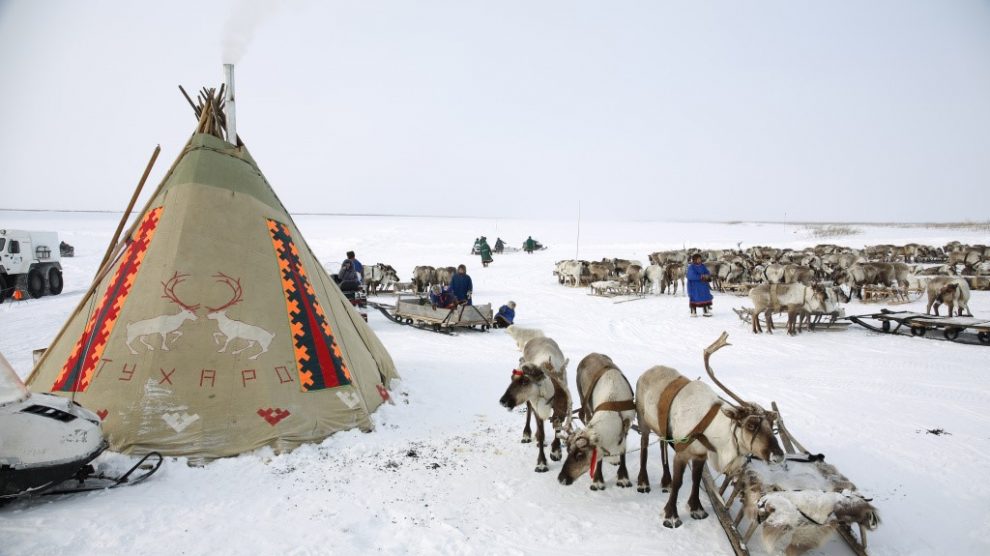Indigenous peoples’ organisations in Russia’s Arctic Taimyr Peninsula will use new funding to help preserve long-standing traditions, while promoting tourism and environmental protection.
Twenty-eight different projects and campaigns in the Russian Arctic will receive grant funding to create a culture of environmental protection, develop infrastructure, and expand educational projects.
Representatives of indigenous peoples’ organisations from across the Taimyr Peninsula in the Russian Arctic will also receive grant funding for the creation of sports clubs, hobby organisations, a small zoo, drone training and other needs.
These are the results of the first grant competition run by the Russian mining giant Norilsk Nickel, whose main production sites are located in places where indigenous peoples live.
- Mining or indigenous rights: Does it have to be one or the other?
- Mining companies need to adopt ESG principles
- Melting permafrost is a threat not just to the Arctic, but to the entire planet
“For our community, participating in this competition was an opportunity to gain support and train mentors, as well as a unifying experience,” says Alexander Shirokikh, chair of the family (tribal) community of northern indigenous minorities Iydyna, which means Moonlight.
“Obviously, we’d like to win and get a grant, but taking part has already proved useful: the support of the experts helped us mould our idea into a proper application. Things like this matter to our organisation,” he added.
Development and promotion
Local authorities also noted the competition’s role in developing and promoting the indigenous territories.
“The competition and the support for public initiatives really make a difference for the non-profit and municipal organisations of Taimyr,” says Tatiana Druppova, deputy head of education and culture of the Taimyrsky Dolgano-Nenetsky Municipal District.
“The grants will not only help preserve long-standing traditions and practices, but also foster the territories’ development through generating jobs, advancing tourism, and promoting distance learning.”
The grants were awarded to six projects from family (tribal) communities, two from non-profit organisations, and 20 projects run by municipal and public institutions.
The winners’ public initiatives address a wide variety of social issues: the revival of national languages, the creation of a create a culture of environmental protection, the development of infrastructure across Taimyr settlements, and the preservation of historical heritage.
Of the competition’s four focus areas, the Taimyr’s Ideas category, encompassing the revival of cultural legacy, support for gifted children, and development of national sports, received the most attention with 17 winning projects.
The project requiring the most funding was one submitted in the Taimyr’s Opportunities category — the TYYAKHA ethnographic park prepared by the Tyyakha family (tribe) community of indigenous minority peoples of the North.
The team behind the project plans to build an ethnic-environmental settlement that will display household and cultural items of Taimyr’s indigenous minorities.
World of Taimyr
The experts hosting the competition noted the excellent preparation and work that had gone into most project submissions, not least because for two months consultants and experts of the support programme under the World of Taimyr competition had assisted the contestants with their submissions.
“The projects that ended up winning are all very advanced, distinctive and vibrant,” says Larisa Zelkova, senior vice president of Nornickel.
“Their authors were able to identify and design social technologies that will invigorate the region and produce sustainable and positive change. The construction of ethnic and sports facilities, establishment of family and linguistic clubs, support for crafts and creative workshops, environmental campaigns, cultural festivals and cross-pollination with the neighboring regions — all of these are important initiatives that will foster the development of the Taimyr territory.”
The award ceremony will take place at the beginning of April during the celebration of Taimyr’s 90th anniversary and Reindeer Herder’s Day.
From June 1, the winners will start bringing their projects to life.
This content has been produced in collaboration with an Emerging Europe partner organisation.







[…] Indigenous culture in Arctic Russia gets funding boost […]